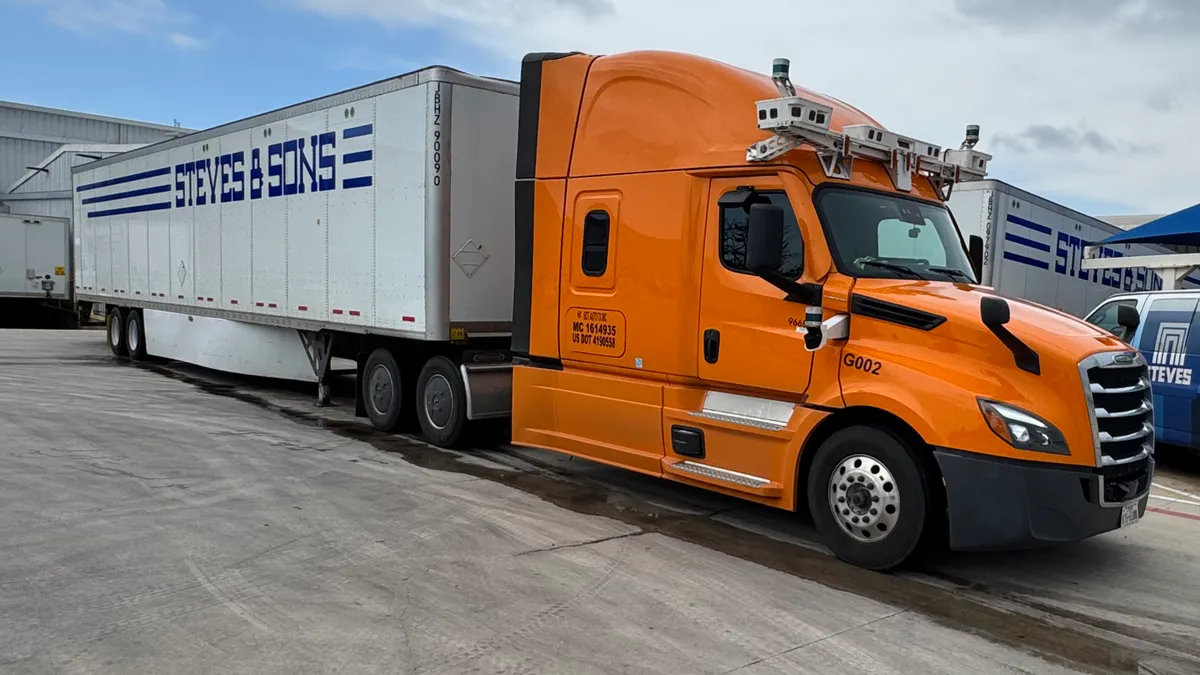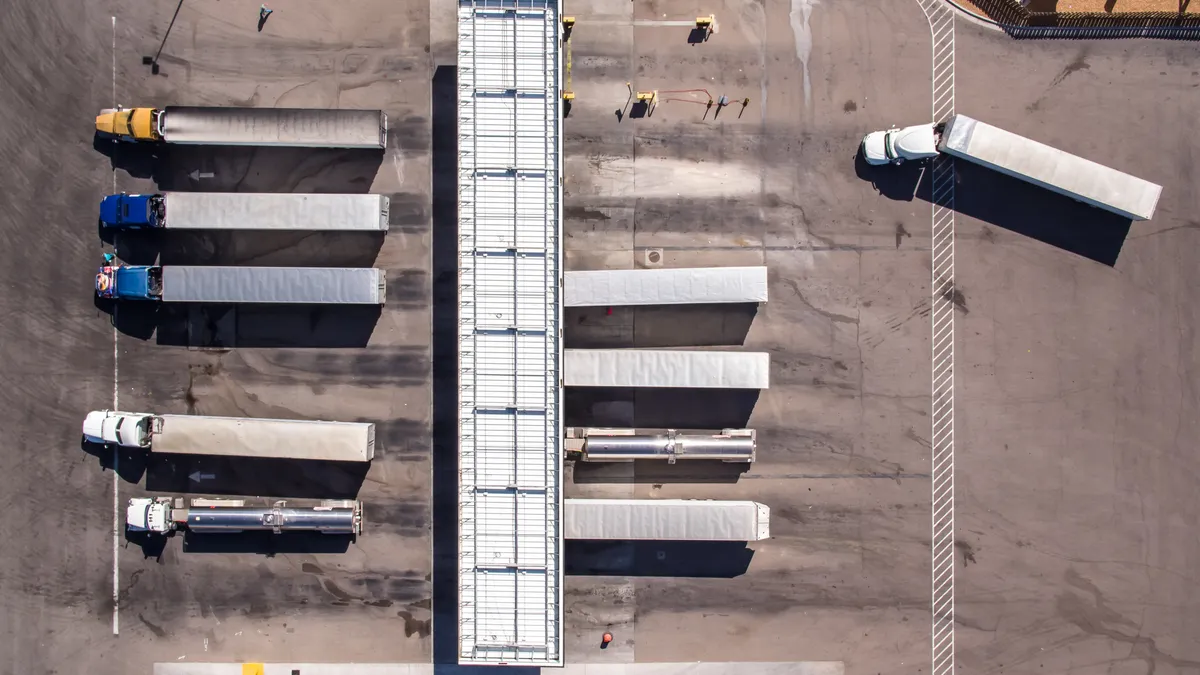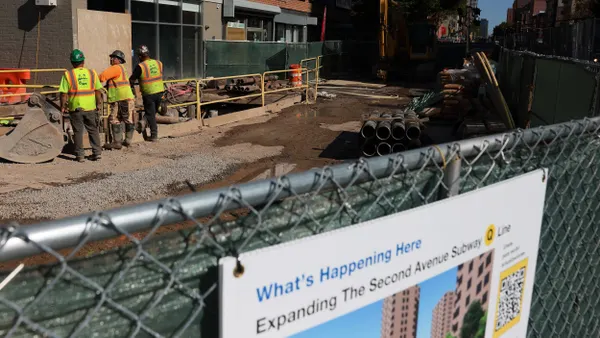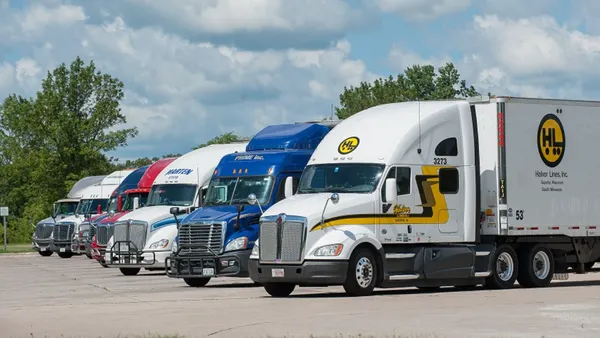Dive Brief:
- Bot Auto aims to launch autonomous trucks for the first time on public routes by the end of the year, relying on the I-10 corridor in Texas between Houston and San Antonio, VP of Business Development and Marketing Robert Brown told Trucking Dive in an interview.
- The Houston-based autonomous trucking company has grown its fleet to eight trucks and is piloting vehicles with drivers onboard. Door manufacturer Steves & Sons is Bot Auto's first publicly announced shipping partner through a deal brokered by J.B. Hunt Transport Services.
- “This collaboration is about more than improving logistics—it’s about reimagining how our industry operates to meet the evolving needs of our customers and communities,” Steves & Sons COO Scott Lovett said in a news release.
Dive Insight:
Steves & Sons sees a cultural shift and potential to make supply chain systems smarter, safer and more adaptive, Lovett said in the release.
With AVs, the manufacturer envisions initial routes between Dallas, San Antonio and Houston, and Riggy’s truck parking locations are helping Bot Auto achieve that development in Texas. Technology-driven solutions will help strengthen and modernize Steves & Sons’ supply chain, the manufacturer said.
Over 35 states allow testing or deployment of autonomous trucks, but other states have restrictive measures, according to California U.S. Rep. Vince Fong, who introduced a bill in July to create a national framework. Industry advocates point to current safety records of autonomous trucks and a future that could be less dangerous than traditional trucking.
“Groundbreaking developments in the autonomous vehicle space hold future promise for improving safety while enhancing not displacing, the invaluable role of truck drivers, our industry's greatest asset,” American Trucking Associations President and CEO Chris Spear said at a Senate subcommittee hearing on July 22.
But many drivers and other stakeholders have clashed with that view while also suggesting jobs are at stake.
“I know some people think it's not coming for a long time, but either way, whether it comes tomorrow or 20 years from now, we have to be prepared and protecting good middle-class jobs is important,” Teamsters General President Sean O’Brien said at the Senate hearing. “And more importantly, it's a public safety issue.”
While AVs can compete for longhaul and middle-mile routes, there will still be a need to finish local trips, and trucks are retrofitted with redundancies to ensure safety, Brown said. He compared the AV industry to that of intermodal, which previously involved unfulfilled fears about how truckers could lose freight.
“We are a transportation provider that fits seamlessly into today how freight is procured,” he said, noting the company owns its trucks and seeks to provide its offerings like any other transportation provider. “We're not having to invent a new business model and a new partnership model to bring an ROI.”
Bot Auto was founded two years ago by Xiaodi Hou, the co-founder and former CEO for TuSimple. That autonomous trucking company pivoted to a focus on AI technology and video game content, according to a December 2024 announcement.
Bot Auto gives Hou another shot at autonomous trucks, and Brown said the new business is a much leaner organization with over 70 employees, most of whom are engineers. This second, more nimble startup, compared to one like TuSimple being founded in 2015, can better leverage automation and AI given advances in the technology, he added.
“There's just a lot of advantages of starting a company two years ago versus back in 2015,” he said.
Premature scaling can burn cash since AVs with drivers are costlier than traditional trucking models. But cost-per-mile comparisons like a recent benchmark from the Boston Consulting Group could help to show how the AV industry can vie for freight.
For Bot Auto, that means the company can go to transportation managers of companies and ask for its AV services to be compared to rates offered by traditional haulers.
“We are a trucking company, and we would love to be judged just as any other transportation provider on safety and levels of service,” Brown said. “We just happen to leverage autonomy.”
Correction: A word in a quote by Robert Brown was incorrectly transcribed in a previous version of this story. The story has been updated.













